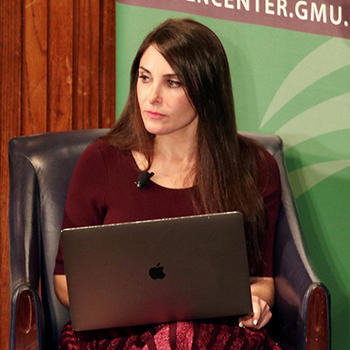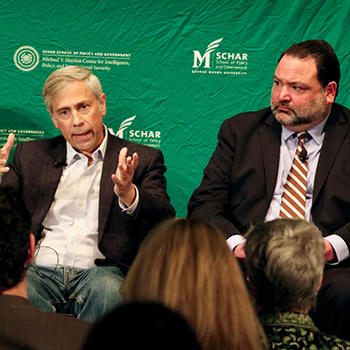

Did WikiLeaks founder Julian Assange commit an act of journalism or one of espionage when he published some 250,000 confidential U.S. military records and diplomatic cables 12 years ago?
That was the long-lingering question, along with many others, posed Monday, December 5, at an evening event at the National Press Club, “The Case of Julian Assange,” hosted by the Schar School of Policy and Government’s Michael V. Hayden Center for Intelligence, Policy, and International Security at George Mason University. More than 100 attended in person, with another 500-plus viewing the discussion via livestream.
If anyone expected fireworks among the four panelists, assembled for their varying expertise in Assange’s case, they would have been disappointed by the civil and even-tempered 90-minute conversation. Not that points were not made and scored. The discussion took on additional relevance with a ticking clock, given that Assange is awaiting possible extradition from Britain to face trial in the U.S. A guilty conviction could land him in jail for up to 175 years.
Adding more topical heat to the event, last week, several major media outlets including the New York Times pleaded for the U.S. government to drop the charges that were invoked in 2017 by the Trump administration, relying on the little-used World War I-era Espionage Act. That raised the question, was the government prosecuting a publisher and thereby challenging his right to free speech?
On stage at the Press Club were former FBI agent Holden Triplett, now a national security consultant; Barry Pollack, Assange’s U.S.-based attorney; Gabe Rottman, a journalist who covers freedom-of-the-press issues; and Mark Zaid, a national security attorney with an expertise in whistleblowing issues.
The talk was moderated by Newsy national security correspondent Sasha Ingber, who did a masterful job keeping the exchange flowing and navigating around answers that nearly required a law degree to interpret.

So: Assange, publisher or criminal? Free to go or life in prison?
If no clear verdict was rendered at the end of the conversation, many in the audience were grateful for the opportunity to hear the case aired in public nonetheless.
“The topic has always interested me and my friends in national security discuss this case a lot,” said Zach Huebschman, a Master of Public Policy candidate at the Schar School, at the end of the evening. “It’s pretty amazing what the Schar School does—you think an event hosted by academia is going to be, well, academic. But here you have an event where people who are representing those involved, from the front lines of where things are happening, are on stage. They’re not just studying [the topic], they’re actually doing the work.”
“The surprising thing for me,” said Kathleen Sowder, who is in her first semester of the Master of International Security program at the Schar School, “is I felt like the case with Assange comes down to whether or not he was a journalist and were his actions protected by the First Amendment. But to have four different panelists with four different perspectives was really great.”
